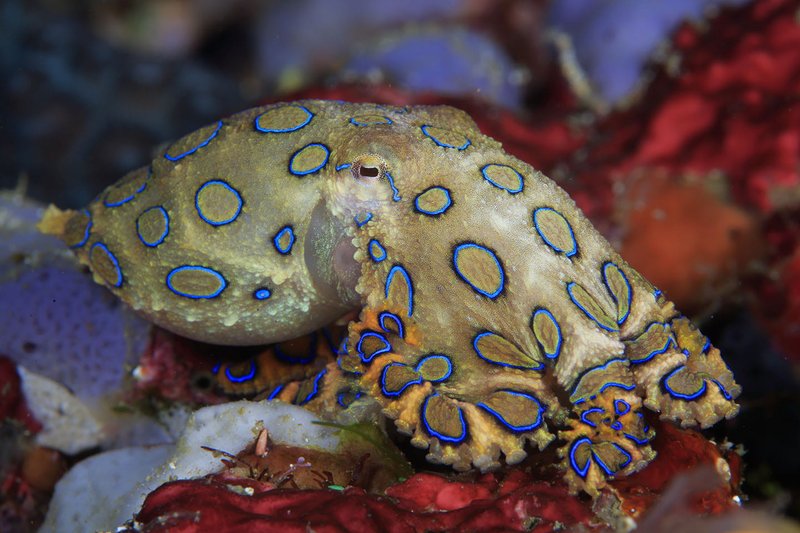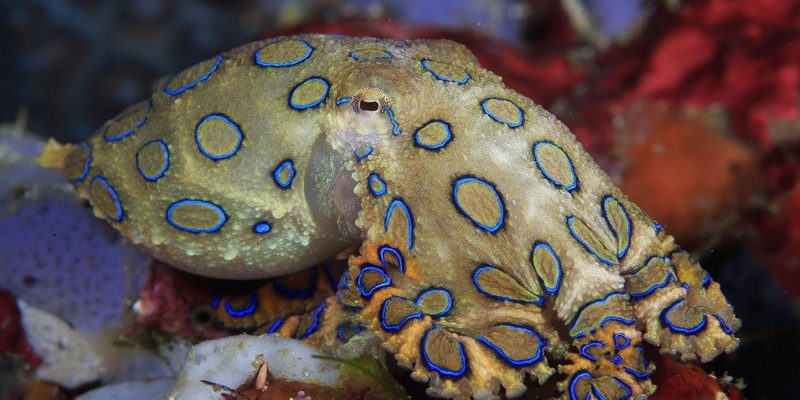
Imagine a small, delicate animal with vibrant blue rings that can light up like a disco ball when it feels threatened. This is the blue-ringed octopus, a fascinating creature found in tide pools and coral reefs around the Pacific and Indian Oceans. They’re known for their beauty and, interestingly, their venomous bite. But as climate change alters these underwater habitats, the blue-ringed octopus is experiencing changes that are putting it at risk. Let’s dive deeper into the specific ways climate change is impacting this remarkable octopus.
The Habitat of the Blue-Ringed Octopus
Understanding how climate change affects the blue-ringed octopus starts with their habitat. These creatures generally thrive in shallow, warm waters near coral reefs. Coral reefs are like underwater cities, bustling with life. But climate change is making these cities more chaotic. As ocean temperatures rise, coral reefs undergo a process called *coral bleaching*, which weakens the reefs and threatens the entire ecosystem.
When corals bleach, they expel the tiny algae living within them, which not only gives corals their color but also provides essential nutrients. Without healthy reefs, blue-ringed octopuses lose their homes and hunting grounds. It’s like losing a favorite restaurant when all the chefs leave. If these octopuses can’t find food, what happens to them? They struggle to survive.
Moreover, as warmer waters affect tidal patterns and currents, the locations where blue-ringed octopuses find shelter can shift dramatically. This means they might have to adapt quickly—and not all will make the leap.
Impact of Ocean Acidification
Another significant challenge for the blue-ringed octopus is *ocean acidification*. As CO2 levels rise in the atmosphere, oceans absorb a lot of this gas. However, this process changes the chemical composition of seawater, making it more acidic. Imagine trying to breathe in a room where the air keeps getting heavier. That’s how it feels for marine life, including our octopus friends.
Ocean acidification affects the availability of calcium carbonate, a vital substance that many marine organisms use to build their shells or skeletons. While blue-ringed octopuses don’t have hard shells, they do rely on their prey—like mollusks and crustaceans—that do. With fewer prey options, the octopuses face food shortages. It’s a little bit like going to your favorite grocery store only to find the shelves empty.
You might be wondering, how does climate change impact the reproduction of the blue-ringed octopus? Changes in water temperature can alter breeding cycles. Typically, these octopuses reproduce in warmer months when their environment is stable. But if temperatures shift unpredictably due to climate change, it can lead to fewer breeding opportunities.
To add to the challenge, increased temperatures can shorten the lifespan of blue-ringed octopuses, which already live only a year or two. They spend a significant part of their life cycle hunting and maturing, and climate impacts might push some to maturity faster than others. Unfortunately, rapid changes might prevent them from fully developing before their time runs out—making an already short life even shorter.
Pollution and Its Effects
Now, let’s talk about pollution—an issue that runs rampant in aquatic ecosystems. As oceans absorb more pollutants, it undermines the health of blue-ringed octopuses and their habitats. Chemicals from plastics and heavy metals can affect their health, reproductive success, and even their coloration. Yes, their beautiful blue rings are not only a warning signal to predators but also an indicator of their overall health. When pollution makes its way into the food chain, it can lead to developmental issues.
Additionally, polluted waters can cause harmful algal blooms, which produce toxins that can disrupt the delicate balance of marine life. If these blooms take over the environment, the blue-ringed octopus is not just losing its habitat—but its entire food supply can be compromised. Essentially, it’s like finding out your favorite café had to shut down because of a city-wide power outage.
Conservation Efforts and Solutions
With all these challenges, what can be done to help the blue-ringed octopus? Well, conservation efforts play a substantial role. Understanding the impact of climate change on marine species is crucial for developing effective solutions.
Organizations around the world are working hard to reduce pollution and promote cleaner oceans. From banning single-use plastics to creating protected marine areas, every effort counts. Educating people about the importance of these creatures can also help raise awareness and inspire action. After all, every little change can lead to a bigger impact.
Additionally, supporting scientific research gives us insight into how to protect ecosystems more efficiently. Think about it: if we can map out where these octopuses thrive, we can build strategies to ensure their habitats are preserved for future generations.
Hope for the Future
The outlook for the blue-ringed octopus might seem daunting, but there’s hope. If we work together to combat climate change, we can help protect these remarkable creatures. Our oceans are interconnected systems, so supporting healthy marine ecosystems benefits everyone, not just the blue-ringed octopus.
Imagine a future where coral reefs are thriving again, teeming with life and color. If humans can successfully tackle pollution and limit climate impact, we can create a safer environment for marine life. You just never know how a change in behavior today might lead to a more vibrant sea tomorrow.
In conclusion, the blue-ringed octopus faces a myriad of challenges due to climate change, from habitat loss to pollution. By understanding their plight, we can better appreciate the importance of acting to protect them. Every small step taken towards environmental awareness can lead to a healthier ocean for generations to come. So, next time you think of climate change, remember it’s not just a distant issue; it’s happening right now, and we have the power to make a difference.

